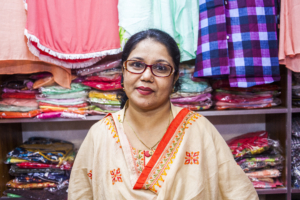ShopUp Helps with Poverty Eradication in Bangladesh

Bangladesh’s economy has grown exponentially in the past 20 years. This raises its GDP per capita by 344% in total since the year 2000. In the last five years alone, this same figure surged 48%. Despite this progress, a significant portion of the country still lives below the poverty line — roughly 20% of a population of 164 million. Recent innovations in poverty eradication in Bangladesh are working to boost economic prospects and facilitate financial security for all of its citizens.
One of these innovations in poverty eradication in Bangladesh is the digital platform ShopUp. ShopUp is co-founded by Afeef Zaman, Siffat Sarwar and Ataur Chowdhury. It began with the goal to empower owners of Facebook businesses with the technical means to grow. More than 50% of Bangladeshis are self-employed. Many of them are operating e-commerce and social commerce shops through Facebook as their source of income. Also, it quickly became evident that clients’ lack of access to capital was hindering their businesses’ growth. After partnering with BRAC in 2018, a Bangladesh-based international development organization, ShopUp now aims to help small business owners acquire credit and other financials when they cannot afford the high cost of formal services.
How ShopUp Benefits Small Business Owners
Transaction records through sites like Facebook can be difficult to track and formalize for loan purposes. ShopUp automatically collects the relevant data from sales on Facebook Messenger. As a result, the merchant can more easily apply to loans from microfinance institutions. Furthermore, the process is quick. When a seller is ready to apply for a loan through ShopUp, the algorithm analyzes 25 different data points from the business’s profile. Additionally, it estimates an appropriate loan ceiling. It only takes 24 hours after approval for the financier to distribute the funds that the borrower requested.
Moreover, it increases access to capital. The service benefits microfinance enterprises by conducting a thorough and efficient online appraisal of the small business applying for the loan. Also, this allows for a significantly lower appraisal fee. This means a higher number of loans can be approved. Growth in the microfinance sector advances the market economy and creates more employment opportunities. In addition to financial assistance, ShopUp provides promotional assistance. Merchants can purchase advertisements for their shops via the service without needing to connect a bank account or credit card. Curated ad placement grants increased visibility. This results in a larger potential customer pool for emerging businesses.
Gender discrimination in Bangladesh means that women tend to face more barriers than men when it comes to employment. With ShopUp’s low cost and ease of access, it is an effective tool for female entrepreneurs to start their small businesses. Women’s participation in the labor force in Bangladesh rose to 36.2% in 2019, in part, due to the expanding market of e-commerce. Furthermore, that same year, 80% of ShopUp’s users were female.
Continued Growth of ShopUp
Investors recognize the potential for ShopUp to increase innovations in poverty eradication in Bangladesh. The founder of eBay, Pierre Omidyar, led a seed round in 2018 encouraging other major companies to assist in funding ShopUp’s endeavors. Google and Amazon were among the contributors for this round which resulted in a $1.62 million investment in the digital service. Data collected in January 2019 show that the platform served 380 individuals after launching the partner project with BRAC. This means it lends out a total of more than 3.1 million (BDT).
ShopUp is just one example of the innovations in poverty eradication in Bangladesh that are putting the country on track to continue its recent economic growth. Widespread Internet usage facilitates a digital market economy that has already provided new opportunities for financial gain. Having accessible services within the market for lower-income individuals is a crucial step in the process.
– Jennifer Paul
Photo: Flickr
